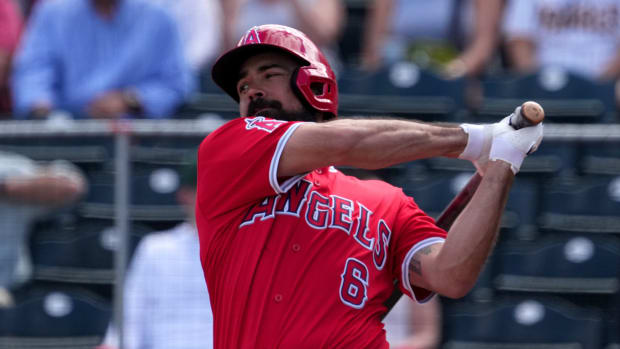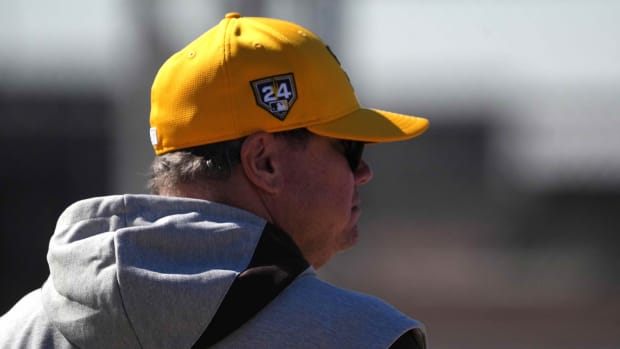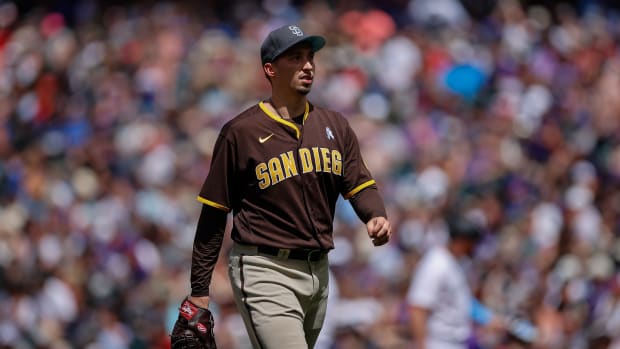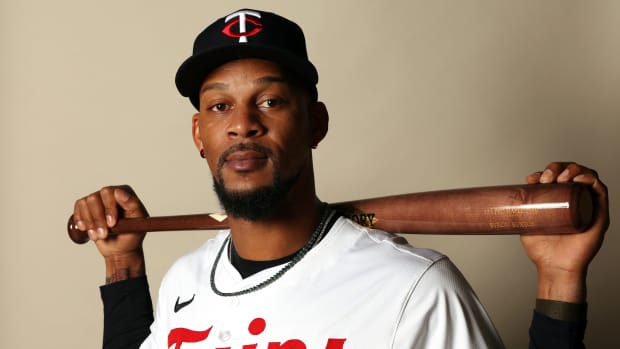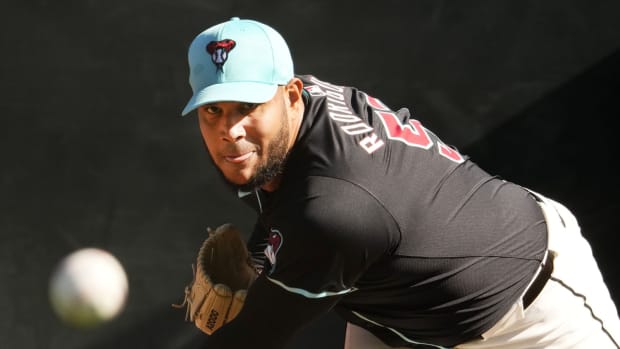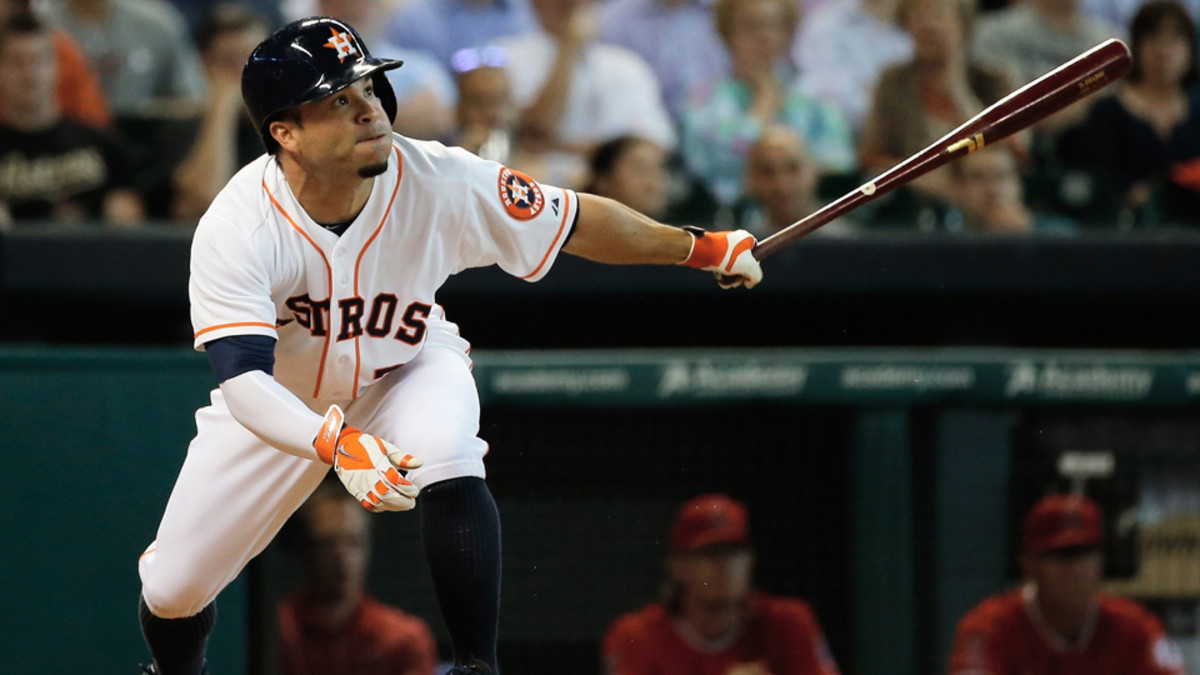
Little big league: How Jose Altuve became an unlikely batting champ
This story appears in the Dec. 9, 2014, issue of Sports Illustrated. Subscribe to the magazine here.
Jose Altuve's 2014 season was full of notable moments, but two in particular stand out.
The first is his 211th hit of the season, a neat single up the middle in the seventh inning of a Sept. 16 game against the Indians, which broke the Astros' franchise record, set 16 years earlier by Craig Biggio. Altuve would finish the season with 225 hits, the most in the majors in five years. But this particular grounder into center, off a slider from eventual American League Cy Young winner Corey Kluber at Minute Maid Park, is the one he'll remember the season by.
The second moment came the following week, in the eighth inning of a close game against the Rangers. The Astros had a man on first with no outs and the hit-and-run was on; Roman Mendez fired a 93-mph fastball roughly at the level of Altuve's helmet brim. Altuve, knowing he had to make contact to protect his teammate running from first, leaped a good foot into the air — and still managed to get his bat around in time to foul off the pitch. "Did he jump?" asked the delighted announcers in a video clip that went quickly and deservedly viral. "I think he jumped!"
JAWS and the 2015 Hall of Fame ballot: Craig Biggio
Altuve is listed as 5-foot-6 (and is really 5-5), tying him with Alexi Amarista for the shortest player in the majors. But if the sight of him leaping to reach a pitch that would have barely been out of the strike zone for some hitters was amusing, it was also a perfect example of Altuve's quick reflexes and athleticism in action. While he didn't make a habit of leaping for his hits this season, Altuve did get them off balls that were up and down, slow and fast, straight and curving, in and out. He finished the season with a majors-best .341 batting average, an on-base percentage of .377, 47 doubles (third in the majors) and seven home runs. He has a quick, compact swing, and when he makes good contact the sound is not the deep thunk you hear when power hitters connect but a satisfying click. He led the AL with 56 steals, while being caught just nine times, and though he didn't walk much (36 in 707 plate appearances), he struck out only 53 times. He hit all season and then, in November, toured Japan with a group of MLB players and led his team in hitting there, too.
"I feel very good," Altuve says, sitting in a dimly lit Houston steak house in late November, a day after flying back from the Far East. Jet lag and all, if a pickup game had materialized, he'd probably have gone 3 for 4 and maybe stolen a few bags. He's muscular and fluid and certainly looks like a pro ballplayer, except that the average major leaguer is 6-2. He is in town for only a few days before he and his wife, Nina — his high school sweetheart — head to Venezuela, where they'll spend the bulk of the off-season near his family in his hometown of Maracay, a baseball-mad city of just over a million that sits between the mountains and Lake Valencia.
Growing up, Altuve idolized longtime big league shortstop and fellow Venezuelan Omar Vizquel (who is 5-9) and later modeled his game on Red Sox second baseman Dustin Pedroia (5-8). "I know I don't have the strength that he does," says Altuve, "but I try to go out like him and play as hard as he does." Because of his size, Altuve is often touted as an inspirational tale of hard work and determination: See, even if you don't have the muscles of Mike Trout, with enough sweat and perseverance you can succeed in the majors! But determination will only take you so far against a major league fastball. Altuve's hand-eye coordination, reflexes and speed, together with the work he did last off-season to remake his swing, is what best explains his success.
***
After hitting .283 with a .316 on-base percentage in 2013, Altuve skipped the Venezuelan winter league and returned early to Houston to dedicate himself to an off-season program that included cardio, agility training and heavy workouts for the legs, like running uphill. "He understood he needed to be in better shape," says longtime Astros bullpen catcher and fellow Venezuelan Javier Bracamonte. "It impressed me how much he changed in one year. And also he learned how to eat. In the minor leagues he was used to eating [fast food]; now he stays away from junk." (Indeed, Altuve ordered grilled striped bass at lunch.)
JAWS and the 2015 Hall of Fame ballot: Jeff Bagwell
Aside from that fitness regimen, Altuve credits his 2014 improvement to adjustments that he made with hitting coach John Mallee at the start of spring training. Mallee, who took the same job with the Cubs in October, thought Altuve could improve his pitch recognition, strike zone discipline early in the count, and the way he handled off-speed pitches. They changed the way Altuve got ready to hit by putting in a leg kick. "The year before, he would stride real early, then drift forward and get into his hitting position, and that created a lot of timing issues," Mallee says. "By being able to do a little leg kick and keep his body in motion, he was able to recognize pitches better and time things much better."
Altuve agrees. "I think I was able to read the trajectory of the ball better and hit the ball harder," he says. "I think that was the key for this year." Altuve is still a free swinger, but in 2014 he cut his strikeout rate dramatically, from 12.7 percent of his plate appearances in '13 to 7.5 percent. "Strikes get called a little higher on his chest than they might on someone else's," says Houston general manager Jeff Luhnow. "But it almost doesn't matter because he's got such good bat-to-ball skills that as long as the ball is anywhere near the strike zone, he's going to be able to put it in play."
Altuve is almost maniacally modest. The only thing he will brag about is his Ping-Pong talent — he claims he's "easily" the best in the Astros' clubhouse — but people around the team say that he had his eye on the batting title before the 2014 season even started. "We had a three-step plan going into spring training," says Mallee. "He's a team player, so to help the team win was his No. 1 goal, but No. 2 was to make the All-Star team, and phase three was to win the batting title. After he made the All-Star team, he said, 'O.K., time to win the batting title; we can do this.'"
Altuve's game is well suited to this era of low offense. (The average major leaguer batted .251 last season, the lowest mark since 1972.) "Run scoring is at more of a premium," says Luhnow. "A player like him, who just doesn't strike out and can make contact, has tremendous value." Base stealing is another way Altuve maximizes his skills. "He was in the best shape of his life," says Mallee, "and he paid attention. He looked for keys on the pitcher, he started to study those things. And he had no fear."
***
The story of Altuve's signing as a 16-year-old in 2006, for $15,000, has already taken on the quality of myth: how he attended an Astros tryout, was cut one day and told not to come back by evaluators who couldn't see past his height. How he showed up at the next session anyway and impressed several observers, including Houston special assistant Al Pedrique, now with the Yankees. Baseball is not always as much of a meritocracy as it would like to believe, but Altuve hopes his story has helped open the minds of talent evaluators. "Whoever plays well should have the right to play," he says.
The thread that runs through most of Altuve's stories is his father, Carlos. Now retired from his job as an assistant to engineers at a chemical company, Carlos was the one who taught Jose to play, and it was Carlos who believed Jose could succeed as a pro. Carlos persuaded his son to go back to the Astros' tryout, believed in him at every far-flung minor league stop and told him when he'd have a rare 0-for-5 day that there was always tomorrow. Because he hates flying, Carlos has traveled to the U.S. to see his son play in the majors only once, in 2013. But he watches every game on TV and continues to offer Jose advice. "Every day he has something to say," says Jose, laughing. "He's always telling me, 'Hit the ball to rightfield.'"
J.J. Putz on leaving the field and moving into the front office
He'll soon be getting advice from Carlos in person. Today's lunch location was chosen in part because of its proximity to Houston's Galleria mall. ("This part of town is really good," he says. "I live in Perla; I got the house last year, but I've got to sell it. It's too boring out there.") Altuve had been at the mall picking up gifts to bring to Venezuela — "Clothes, shoes, speakers." And a little something for himself: a new pair of KDs, a photo of which he displays on his iPhone as proudly as a family snapshot. He also loads up on gear to distribute to those who can't afford it. Altuve will spend part of his time this winter coaching an informal baseball clinic in Maracay for eight-to-13-year-olds. He gets recognized in Venezuela far more often than he does in Houston. "Not everywhere," he says, "but pretty much everywhere."
Fame doesn't weigh on Altuve. He's often spotted in the mall, as he was twice while procuring his KDs, but he enjoys signing autographs and posing for photos. "I think in this game you will get as far as the fans let you go," he says. "I owe them a lot." He likes to imagine what the city, and Minute Maid Park, would be like with the Astros in the playoffs, and what it would mean to the fans who've supported the team throughout the last few trying seasons.
The 2014 Astros won 19 games more than they did the season before, but they still finished 70-92. Altuve, 24, has worked hard to become a leader of this young team. "It's hard when you come to the ballpark, lose a game, lose another game," says Bracamonte. "A lot of players came to him." Altuve tried to channel their frustrations into something productive. "He said, 'Make sure you do your work when you come to the ballpark,'" Bracamonte says. "He was on top of a lot of the players: 'Let's go work out, before the game, after the game, we should be here early, take ground balls, do what you need to do in the cage.'"
Adds Altuve, "Everyone knows we've been trying to rebuild. I think we've reached the point where we have rebuilt. I believe we have a very good shot to be in the playoffs." This makes Altuve more optimistic than most observers, but self-doubt isn't in Altuve's DNA. Asked if there were ever a time in his five-year trek to the majors when he wondered if he might not make it, Altuve doesn't hesitate: "No." He never doubted he'd make the leap.






























